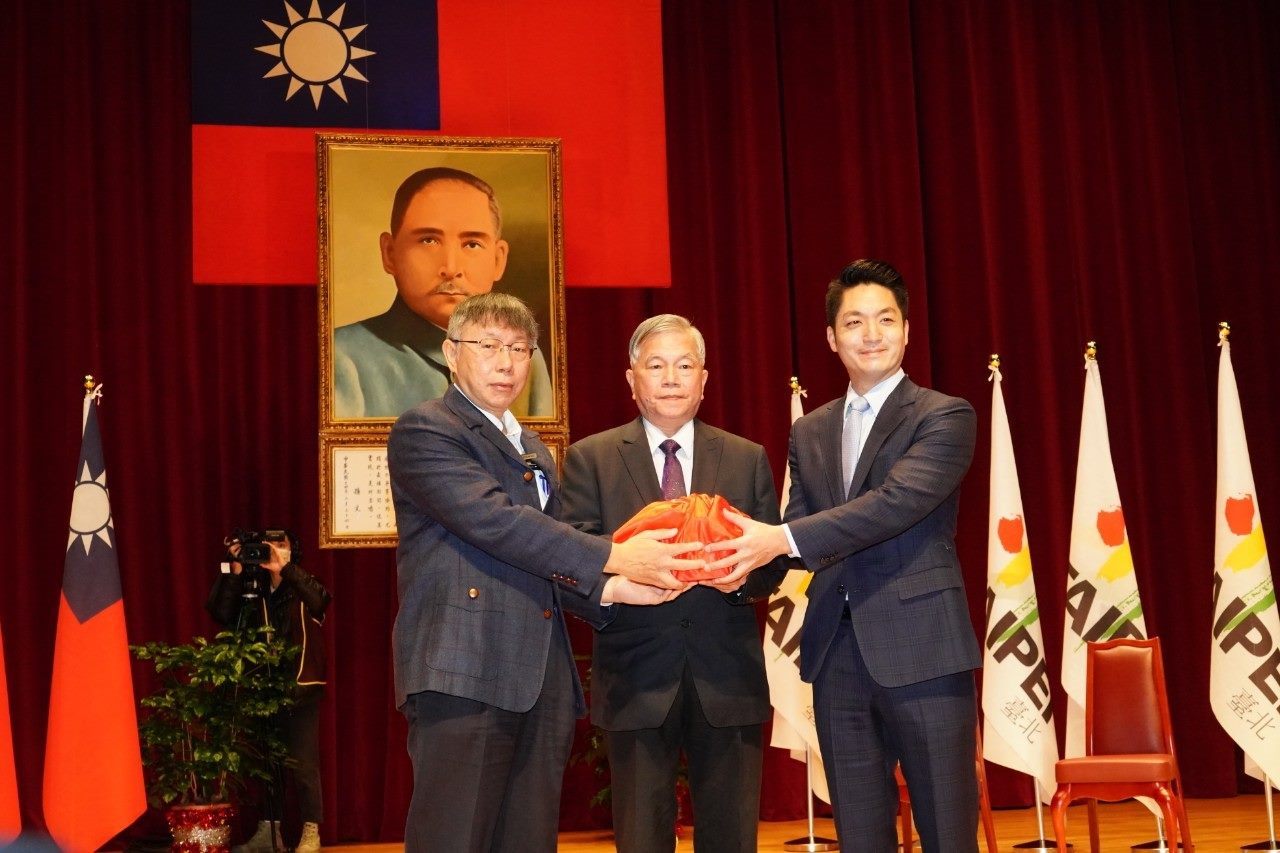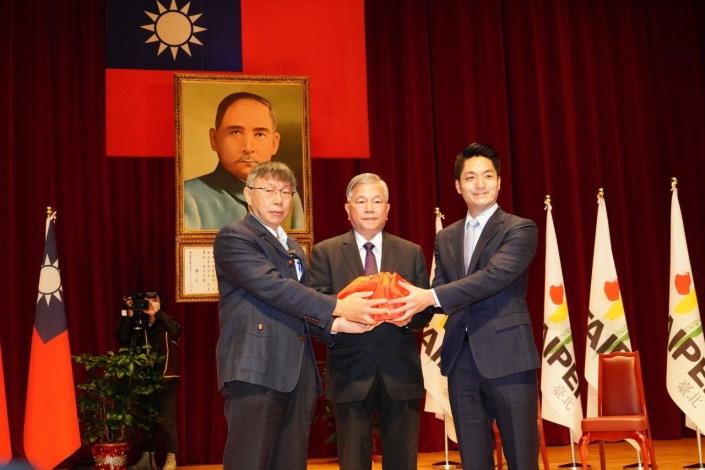Chiang Wan-an Takes Office as Mayor of Taipei City
Ko remarked that handover of city administration has proceeded smoothly following numerous work meetings before the ceremony. He looks forward to the new administration to continue along the path of transforming Taipei City and making it more wonderful and livable. The outgoing mayor stressed that Taipei’s glory is the accumulation of citizens’ wisdom and the combined effort of past mayors. Former mayor Wu Po-hsiung rezoned Taipei’s administrative districts and began work on the MRT system; former mayor Huang created the Daan Forest Park, implemented the Keelung River Straightening project, and dismantled the Zhonghua Market; former mayor Chen kicked-off MRT operations and made city services more accessible and closer to citizens; former mayor Ma established the district sports centers and implemented the per-bag trash fee collection; former mayor Hau consolidated the 1999 Citizens’ Hotline and promoted the YouBike Shared-bicycle System. These policies formed a solid basis in transforming Taipei into a livable city. In the face of complex city affairs, the administration encountered numerous challenges. Ko shared his experience in tackling such issues with the new administration. For him, the best approach is to evaluate the issue by adopting a perspective from 50 years into the future. Doing so will make the answer fairly obvious. At the end of his address, Ko pointed out that while mayors have turn limits, city administration is continuous and the baton will be passed onto the next leader. He looks forward to Mayor Chiang and his team to oversee city affairs with integrity and honesty. What is important is not to sacrifice long term benefits for short term gains, and not to ignore the rights of the few in exchange for the benefits of the many. Mayor Chiang began his speech by thanking the citizens of Taipei City for their trust, allowing him to serve them for the next four years. He noted that Taipei City boasts the first railway station, the first MRT line, the first private bank, the first BOT case, the first district sports center, and the Taiwanese Cultural Association – an organization unlocking the political and cultural potentials of the Taiwanese people. From physical constructions to political doctrines, Taipei has always taken on the role of a pioneer. With the burden of city administration on his shoulders, the new mayor remarked that in the face of global city competition and constantly-changing trends, his administration must remain attentive and should never be satisfied with the status-quo. It must thrive to become better so as to remain competitive on the international stage. He remarked that he is glad his platform highlighting “Four Developments and Five Center” won the approval of Taipei’s residents. He will work on building Taipei’s future across the domains of commerce and finance; startup and entrepreneurship; talents attraction and incubation, and conservation of cultural assets. According to Chiang, there is always a list of priorities when it comes to city management. In the future, his priority will be the implementation of “four windows of opportunity”: making Taipei a prosperous city; helping the city retain talents as a way of creating a “city of talents”; promoting green buildings to make Taipei a modernized city, and merging city tourism with local characteristics to establish Taipei as a charismatic city. He also pledges to work on maintaining a smooth relationship between city hall and city council. since city councilors are voted into office by citizens and speak for the interest of their constituents, they are to be respected for their expertise, perspective, and knowledge of the needs of their home district. At the end of his speech, Chiang described Taipei as being embraced by major river systems including Tamsui River, Xindian River, and Jingmei River, as well as Keelung River winding through the city’s parameters. The characteristic of a river city is to accept and accommodate different flows and currents. Using these forces as a source of dynamic energy, the city will continue to grow and develop alongside its residents for generations to come. Taipei is the “locomotive” leading the entire island, and his administration will work with citizens to create a glorious city that links up with the world. Taipei City’s New Mayor Chiang Wan-an officially took office following a ceremony at city hall on December 25. Outgoing mayor Ko Wen-je, Vice Premier Shen Jong-chin, former mayor Ma Ying-jeou, and former mayor Huang Ta-chou were among the dignitaries attending the event.
Taipei City’s New Mayor Chiang Wan-an officially took office following a ceremony at city hall on December 25. Outgoing mayor Ko Wen-je, Vice Premier Shen Jong-chin, former mayor Ma Ying-jeou, and former mayor Huang Ta-chou were among the dignitaries attending the event.


![Taiwan.gov.tw [ open a new window]](/images/egov.png)
